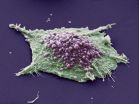(Press-News.org) The majority of adults surveyed indicated they would want administration of clot-dissolving medications if incapacitated by a stroke, a finding that supports clinicians' use of this treatment if patient surrogates are not available to provide consent, according to a study in the April 23/30 issue of JAMA, a neurology theme issue.
"In life-threatening emergencies involving incapacitated patients without surrogates, clinicians may intervene without obtaining informed consent, applying the presumption that reasonable people would consent to treatment in such circumstances. Whether this rationale applies to the treatment of acute ischemic stroke with intravenous thrombolysis [administration of clot-busting agent] is controversial because this intervention improves functional outcomes but is not life preserving. Nonetheless, the presumption of consent to thrombolysis for ischemic stroke has recently been endorsed by professional societies," according to background information in the study.
Winston Chiong, M.D., Ph.D., of the University of California, San Francisco, and colleagues examined presumption of consent by comparing preferences for treatment of acute ischemic stroke with thrombolysis and treatment of sudden cardiac arrest with cardiopulmonary resuscitation (CPR; in which the presumption of consent is generally accepted) in a nationally representative sample of U.S. adults 50 years of age or older. The participants were randomly assigned to read 1 of 2 scenarios: in one they experienced a severe acute ischemic stroke and were brought to a hospital, and in the other they experienced an out-of-hospital cardiac arrest and were attended to by paramedics.
The stroke scenario included a graphical depiction of potential risks and benefits of treatment with thrombolysis. The cardiac arrest scenario included a similar depiction of potential outcomes after paramedic-initiated CPR. All participants were then asked whether they would want the treatment described.
The researchers found that 76.2 percent of older adults (419 of 545 participants) wanted thrombolysis for acute ischemic stroke and 75.9 percent of older adults (422 of 555 participants) wanted CPR for sudden cardiac arrest. Female sex, divorced marital status, and lower educational attainment predicted refusal of thrombolysis; poorer physical health, previous stroke, and possession of a health care advance directive predicted refusal of CPR.
"When an incapacitated older patient's treatment preferences are unknown and surrogate decision makers are unavailable, there are equally strong empirical grounds for presuming individual consent to thrombolysis for stroke as for presuming individual consent to CPR. Because the presumption of consent is generally accepted for CPR, this finding provides empirical support for policy positions recently taken by professional societies that favor the use of thrombolysis for stroke in emergency circumstances under a presumption of consent," the authors write.
INFORMATION:
(doi:10.1001/jama.2014.3302; Available pre-embargo to the media at http://media.jamanetwork.com)
Editor's Note: Please see the article for additional information, including other authors, author contributions and affiliations, financial disclosures, funding and support, etc.
Study examines patient preferences for emergency treatment of stroke
2014-04-22
ELSE PRESS RELEASES FROM THIS DATE:
Specialized ambulance improves treatment time for stroke
2014-04-22
Using an ambulance that included a computed tomography (CT) scanner, point-of-care laboratory, telemedicine connection and a specialized prehospital stroke team resulted in decreased time to treatment for ischemic stroke, according to a study in the April 23/30 issue of JAMA, a neurology theme issue.
Stroke is a leading cause of death and disability. In acute ischemic stroke, thrombolysis (dissolving of blood clots) using intravenous tissue plasminogen activator (tPA) is the treatment of choice after excluding bleeding in the brain by imaging. Past studies have shown ...
Study examines effectiveness of medications for treating epileptic seizures in children
2014-04-22
Although some studies have suggested that the drug lorazepam may be more effective or safer than the drug diazepam in treating a type of epileptic seizures among children, a randomized trial finds that lorazepam is not better at stopping seizures compared to diazepam, according to a study in the April 23/30 issue of JAMA, a neurology theme issue.
Status epilepticus is a prolonged epileptic seizure or seizures that occurs approximately 10,000 times in children annually in the United States. Rapid control of status epilepticus is essential to avoid permanent injury and ...
Stroke treatment, outcomes improve at hospitals participating in UCLA-led initiative
2014-04-22
Administering a clot-dissolving drug to stroke victims quickly — ideally within the first 60 minutes after they arrive at a hospital emergency room — is crucial to saving their lives, preserving their brain function and reducing disability.
Given intravenously, tPA (tissue plasminogen activator) is currently the only Food and Drug Administration–approved therapy shown to improve outcomes for patients suffering acute ischemic stroke, which affects some 800,000 Americans annually.
Now, a UCLA-led study demonstrates that hospitals participating in the "Target: ...
Newly approved brain stimulator offers hope for individuals with uncontrolled epilepsy
2014-04-22
(Chicago) – A recently FDA-approved device has been shown to reduce seizures in patients with medication-resistant epilepsy by as much as 50 percent. When coupled with an innovative electrode placement planning system developed by physicians at Rush, the device facilitated the complete elimination of seizures in nearly half of the implanted Rush patients enrolled in the decade-long clinical trials.
That's good news for a large portion of the nearly 400,000 people in the U.S. living with epilepsy whose seizures can't be controlled with medications and who are not candidates ...
Physicists consider implications of recent revelations about the universe's first light
2014-04-22
Last month, scientists announced the first hard evidence for cosmic inflation, the process by which the infant universe swelled from microscopic to cosmic size in an instant. This almost unimaginably fast expansion was first theorized more than three decades ago, yet only now has "smoking gun" proof emerged.
What is this result and what does it mean for our understanding of the universe? Late last week, two members of the discovery team discussed the finding and its implications with two of the field's preeminent thought leaders.
Walter Ogburn is a postdoctoral researcher ...
Biting vs. chewing
2014-04-22
There's a new secret to get your child to behave at the dinner table—cut up their food and they'll relax.
A new Cornell study published in Eating Behaviors, found that when 6-10 year old children ate foods they had to bite with their front teeth— such as drumsticks, whole apples, or corn on the cob— they were rowdier than when these foods had been cut. "They were twice as likely to disobey adults and twice as aggressive toward other kids," said Brian Wansink, Professor and Director of the Cornell Food and Brand Lab.
During a 4-H summer camp, 12 elementary children ...
Bioinformatics profiling identifies a new mammalian clock gene
2014-04-22
PHILADELPHIA - Over the last few decades researchers have characterized a set of clock genes that drive daily rhythms of physiology and behavior in all types of species, from flies to humans. Over 15 mammalian clock proteins have been identified, but researchers surmise there are more. A team from the Perelman School of Medicine at the University of Pennsylvania wondered if big-data approaches could find them.
To accelerate clock-gene discovery, the investigators, led by John Hogenesch, PhD, professor of Pharmacology and first author Ron Anafi, MD, PhD, an instructor ...
Clinics not bogged down by red tape can ease health cost burdens
2014-04-22
Health clinics that can provide primary care for low-income patients may ease the financial burden on both hospitals and insurance companies while improving patient health, researchers have concluded.
A study of hospital admissions suggests that health clinics that avoid costs associated with insurance administration can help hospitals save money by lowering hospital admission rates and emergency room visits, according to Mark Agee, professor of economics, Penn State Altoona.
The researchers estimated that the major hospital in the area saved $201,414 annually in lower ...
Depressed? Researchers identify new anti-depressant mechanisms, therapeutic approaches
2014-04-22
DALLAS – April 22, 2014 – Researchers at UT Southwestern Medical Center are making breakthroughs that could benefit people suffering from depression.
A team of physician-scientists at UT Southwestern has identified a major mechanism by which ghrelin (a hormone with natural anti-depressant properties) works inside the brain. Simultaneously, the researchers identified a potentially powerful new treatment for depression in the form of a neuroprotective drug known as P7C3.
The study, published online in April's issue of Molecular Psychiatry, is notable because although ...
Scientists pinpoint protein that could improve small cell lung cancer therapies
2014-04-22
Approximately 15 percent of all lung cancers are small cell lung cancers (SCLC), which grow rapidly and often develop resistance to chemotherapy. However, researchers at Virginia Commonwealth University Massey Cancer Center have revealed new insights into the mechanisms leading to this resistance that may lead to improved therapies.
Chemotherapies work primarily by mediating B-cell lymphoma 2 (Bcl-2) family proteins, which are responsible for regulating cell death. Depending on their function, this family of proteins can trigger a form of cell suicide known as apoptosis ...



